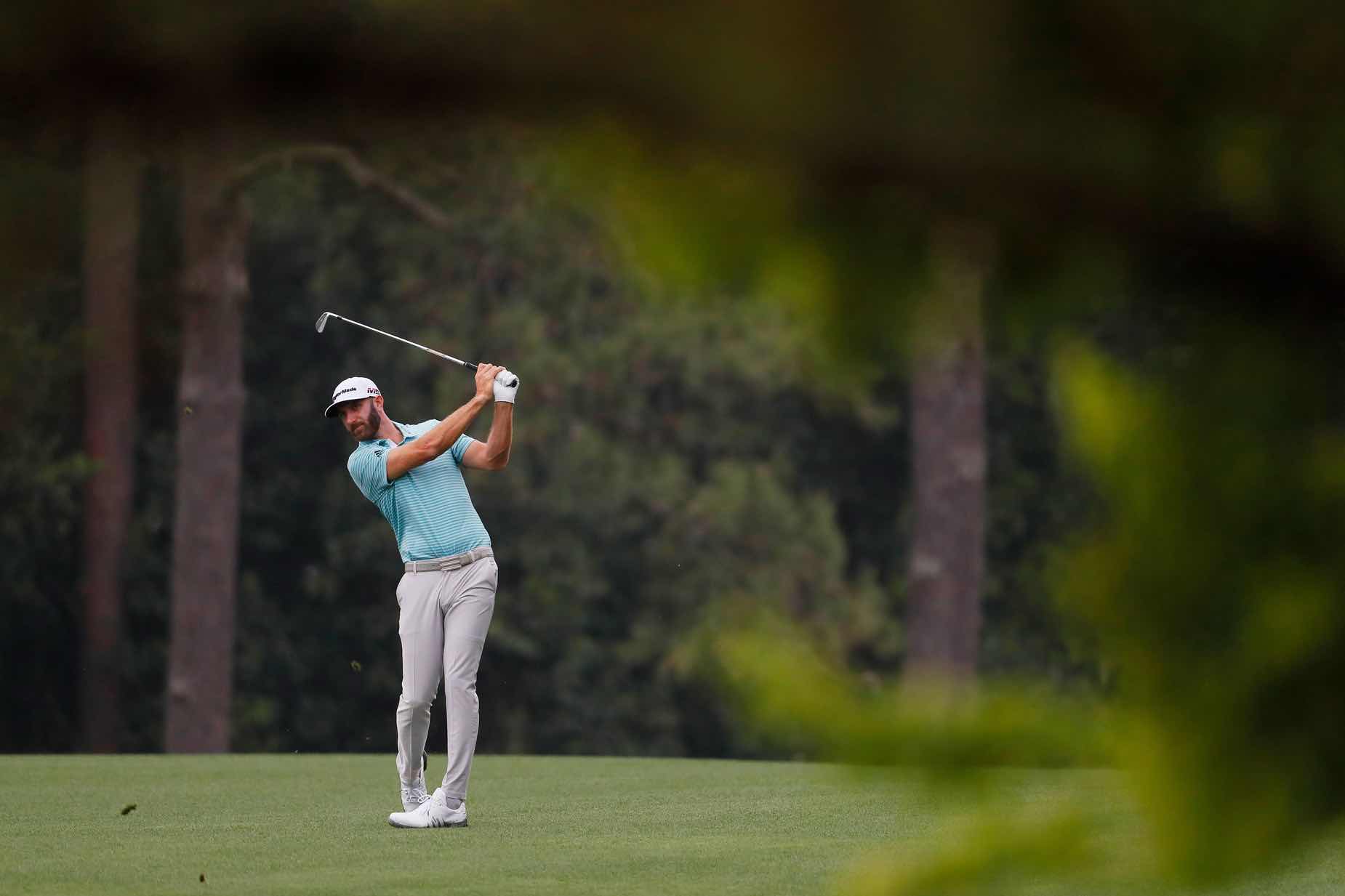If Dustin Johnson showed up for his pre-Masters press conference on Tuesday afternoon and announced he’d had enough of the golf grind and was retiring at age 34, he could walk off into the Augusta sunset knowing his next metaphorical stop would be the World Golf Hall of Fame. He’s won 20 times on the PGA Tour, one of those victories coming at the 2016 US Open. He’s played on four US Ryder Cup teams and come achingly close to winning a couple more Majors. Enough said.
Assuming though that he doesn’t call it quits and tees it up Thursday at Augusta National for his ninth Masters appearance, the case can be made that the 34-year-old from Myrtle Beach, South Carolina, is under as much pressure as any of the 87 players in the field this week, save perhaps for Rory McIlroy who will be taking his fifth shot at completing the career Grand Slam.
Why? Because there are Hall of Famers and there are HALL OF FAMERS.
Fred Couples, Tom Kite, Davis Love III and Colin Montgomerie are all Hall of Famers. The first three won enough times that their one major victory was enough to get them voted into St Augustine. Montgomerie never won a Major but his remarkable Ryder Cup record and dominance on the European Tour earned him enough votes to join the elite.
And then there are HALL OF FAMERS, players who accomplishments register with the most casual golf fans. Nick Faldo, Seve Ballesteros, Raymond Floyd, Phil Mickelson and, yes by my watch, McIlroy come to mind for this group. (There are also some players for whom the term Hall of Famer – lower case or in capitals – is inadequate. Jack Nicklaus, Tiger Woods, Ben Hogan, Walter Hagen, Gary Player, Tom Watson, Arnold Palmer, Sam Snead and Byron Nelson are on this list. All-time greats is more like it.)
The question for Johnson then, is can he get his unofficial Hall of Fame plaque to reach capital letters. There’s no one in golf who doesn’t believe that he has the talent to do so. He is one of those rare players who, when at his best, is virtually unbeatable. His most recent win, at the WGC-Mexico last month, was by five shots over McIlroy – whose best is also pretty good. Johnson is one of a very small handful of players who other players talk about in reverent tones of awe at times.
Two years ago, Johnson arrived at Augusta as close to an overwhelming favourite as anyone had been since the Tiger Woods 1.0 Era ended. He had won his last three starts – in Los Angeles, in Mexico and at the WGC-Match Play. The only surprise in those three wins was that Jon Rahm had gamely taken him to the 18th hole in the match-play final.
Augusta National has always been a course that should fit Johnson’s game, and yet he’s never seriously contended – although he finished T-4 in 2016 two months prior to his breakthrough US Open win at Oakmont. Then, 48 hours before the 2017 tournament began, came the bizarre slip on the steps and his withdrawal the day before the Masters was to begin.
Since then, Johnson has won five times – a more than respectable number – including several of those dominating victories: Maui by eight strokes to start 2018; Memphis by six last June and the five-shot margin in Mexico.
But his record in Majors hasn’t been close to what might be expected: He’s played seven times and finished in the top 10 twice: a T-10 at Augusta last year and a third-place finish at Shinnecock Hills last June when Brooks Koepka’s brilliant weekend overtook – and overshadowed – him and everyone else. And he was also a desultory 1-4 in last year’s Ryder Cup, including a singles loss to Ian Poulter. Hardly superstar stuff, and Johnson is expected by most in golf to put on superstar performances.

It is all well and good for him to put on his cape and play jaw-dropping golf in Mexico or Hawaii or Los Angeles. That’s why his resume is already Hall of Fame worthy. But can he be better than that? That’s the remaining question in Johnson’s career, the one that will decide his ultimate legacy in the game. Johnson has played in 38 Majors to date and has the one victory.
He could have had two Majors in 2010, when he was still just 25. He had a three-shot lead after 54 holes at the US Open at Pebble Beach before a meltdown 82 on the final day.
Two months later, he took a one-shot lead to the final hole at Whistling Straits at the PGA Championship and sprayed his drive right leading to the “is it a bunker or is it not a bunker” debacle that left him with a triple-bogey 7 (add two for grounding your club in a PGA of America created “bunker”) and finished those two shots out of the Martin Kaymer-Bubba Watson playoff.
There was also the 2011 Open Championship where he was on Darren Clarke’s heels on the final day before whistling a 5-iron out-of-bounds on the par-5 14th hole at Royal St George’s, leading to double-bogey 7 and, eventually a tie for second with Mickelson – three shots behind Clarke. And there was the infamous three-putt on the 72nd hole at Chambers Bay, that gave Jordan Spieth a one-shot victory in the 2015 US Open.
Johnson has the talent to win on any golf course at any moment. For all the talk about his length, his short-game is one of the best in the sport, something he has worked at improving in recent years.
His laid-back, “yeah-whatever” approach clearly serves him well most of the time, never more so than at Oakmont when the USGA delivered its “it might or might not be a penalty stroke” declaration on the 12th tee on Sunday. Johnson rescued the USGA from the mother of all controversies that day by pulling away to win by four shots – three after the penalty was finally assessed.
“I’m honestly not sure how I would have handled what they [the USGA] did to Dustin,” Rory McIlroy said weeks after the championship. “I’d like to think I’d have been able to just keep playing, but I’m not sure I could have. I’m not sure a lot of guys could have. But DJ isn’t like a lot of other guys.”
That he has bounced back from some of the devastating losses he’s suffered in Majors to continue to play as well as he has, is certainly evidence of that. But Johnson is now at the point in his career where no one is counting top-five finishes at the Majors. They’re counting wins. And, right now, the count is stuck on one.
Johnson’s going to have plenty more chances to win Majors in the next 10 years or so. But if he wants to get to that HALL OF FAME category as opposed to Hall of Fame, he needs to jump-start the Major victory count sooner rather than later.
If he can double the number by dusk on Sunday, that would be a very good new beginning.




